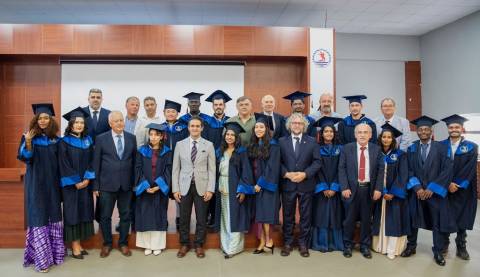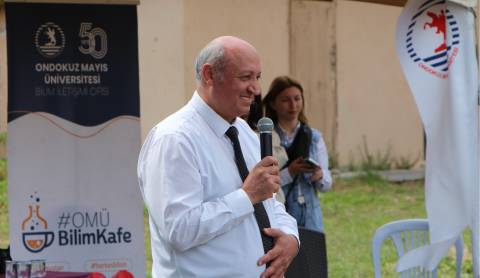OMU Hosts International Panel Highlighting Strategic Importance of Hemp for a Sustainable Future
The "Current Approaches in Hemp" panel, organized by Ondokuz Mayıs University (OMU) Hemp Research Institute, brought together academics, industry representatives, and students. The event focused on industrial hemp's economic and scientific potential, emphasizing its strategic importance for a sustainable future.
The event saw the participation of OMU Vice Rector Prof. Dr. Çetin Kurnaz, OMU Secretary General Prof. Dr. Erhan Burak Pancar, Director of OMU Hemp Research Institute Prof. Dr. Selim Aytaç, Prof. Dr. Wu Zhaohui from Oregon University, Dean of the Faculty of Engineering Prof. Dr. Yıldıray Topçu, OMU Yeşilyurt Iron and Steel Vocational School Director Assoc. Prof. Dr. Gökhan Demir, national and international academics, private sector representatives, and students.
Highlighting the Economic Opportunities of Industrial Hemp
The symposium opened with remarks from Prof. Dr. Wu Zhaohui, the Hemp Innovation Center coordinator at Oregon University. Emphasizing industrial hemp's global supply chain role and economic opportunities, Zhaohui highlighted the significance of academic collaborations between OMU and Oregon University.
Medical and Industrial Uses of Hemp
OMU Vice Rector Prof. Dr. Çetin Kurnaz stated that hemp is among the oldest agricultural plants in human history, particularly emphasizing its medical significance. "More than 7,500 scientific articles related solely to medical hemp have been published in the last five years, reflecting growing interest in the healthcare sector," he said.
Prof. Kurnaz underlined that industrial hemp is used in about 25,000 different products and that the global market value is rapidly increasing. "The hemp sector was valued at 7.55 billion dollars in 2022, which is expected to reach 75 billion dollars by 2030. Besides its economic contributions, hemp also significantly supports sustainable production models," he added.
"We believe Türkiye will achieve a significant position in the global hemp ecosystem"
Describing hemp as a strategic agricultural product, Kurnaz emphasized Türkiye's potential in this area, stating, "We believe that our research based on scientific excellence, innovation, and robust public-private partnerships will position Türkiye prominently in the global hemp ecosystem."
Prof. Dr. Selim Aytaç: "The Hemp Sector is Reviving in Türkiye"
Prof. Dr. Selim Aytaç, Director of OMU Hemp Research Institute, noted that although hemp has been historically utilized in various sectors, its production was occasionally restricted due to psychoactive components. With recent developments in breeding low-psychoactive industrial hemp varieties, its applications have once again expanded significantly.
"Hemp has an extensive usage spectrum, from construction and pharmaceuticals to food and polymer materials. In our country, research and development in this sector have accelerated significantly," Aytaç explained.
Aytaç reminded that OMU's hemp research began in 1992, and the Hemp Research Institute, established in 2019, now conducts research in three central departments: Agriculture and Breeding; Food, Feed, and Medicine; and Industry and Marketing.
International Collaborations and Scientific Presentations
Aytaç added that the institute engages in educational activities and public awareness initiatives alongside research. "We closely follow international developments and aim to expand our collaborations," he mentioned, noting the participation of academics from the Oregon State University Hemp Innovation Center.
Prof. Dr. Wu Zhaohui from Oregon University delivered a presentation on industrial hemp. Additionally, Assoc. Prof. Dr. Serkan Ateş introduced the project scope, Assoc. Prof. Dr. Massimo Bionaz discussed hemp use in animal nutrition, and Assoc. Prof. Dr. Chad Higgins explained irrigation methods in hemp cultivation.
Prof. Dr. Enver Esendal, a pioneer in hemp research at OMU, moderated the panel discussion.
TÜBİTAK-Supported Hemp Breeding Project Introduced
The conference also hosted the closing launch of the TÜBİTAK 1001-supported Hemp Breeding project, presenting planned collaborations between OMU and Oregon University.
Products Derived from Hemp Showcased
The event featured exhibitions by Samsun Metropolitan Municipality, Samsun Olgunlaşma Institute, and OMU Hemp Research Institute, displaying clothing, cosmetics, and other hemp-derived products. The event concluded with the presentation of certificates and commemorative photographs.


















